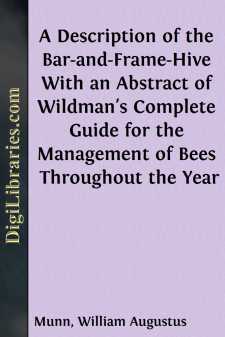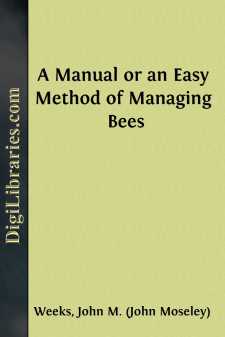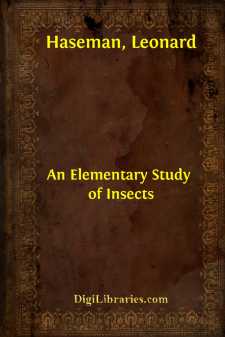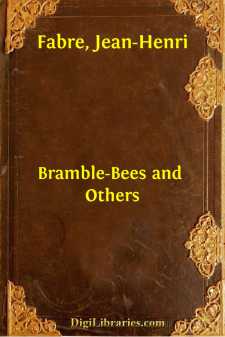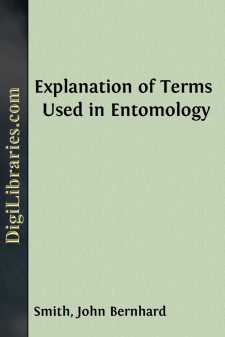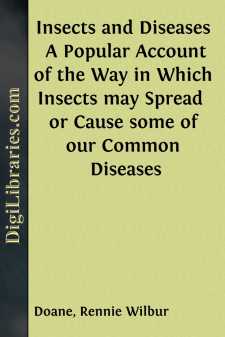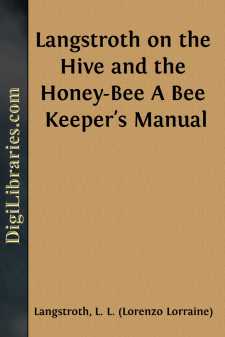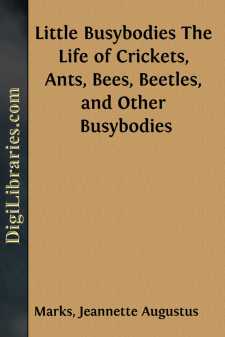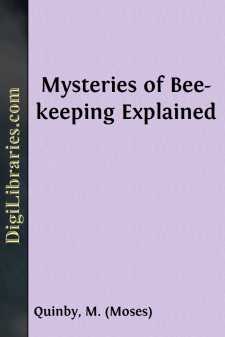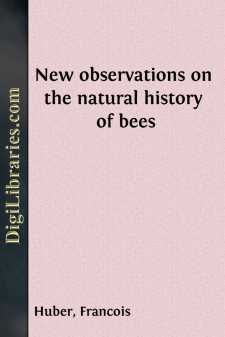Nature
- Animals 47
- Birds & Birdwatching 41
- Dinosaurs & Prehistoric Creatures 1
- Flowers 5
- General 32
- Horses 6
- Insects & Spiders
- Mammals 7
- Mushrooms 2
- Natural Disasters 6
- Natural Resources 3
- Reptiles & Amphibians 2
- Trees & Forests 10
Insects & Spiders Books
Sort by:
PREFACE Having been frequently requested to explain the use of the bar-and-frame-hive, in the management of bees, I have been induced to print the following pamphlet, to point out the advantages this new hive possesses over the common ones. I have added extracts from various authorities to show the importance of transporting bees for a change of pasturage, and thus prolonging the honey harvest....
more...
RULE I. ON THE CONSTRUCTION OF A BEE-HIVE. A bee-hive should be made of sound boards, free from shakes and cracks; it should also be planed smooth, inside and out, made in a workmanlike manner, and painted on its outside. REMARKS. That a bee-hive should be made perfect, so as to exclude light and air, is obvious from the fact, that the bees will finish what the workman has neglected, by plastering up...
more...
by:
Leonard Haseman
INTRODUCTION In the preparation of a book of this nature, to be used in the grade schools, we realize that the one fundamental thing to keep in mind is the economic importance of the insect, be it good or bad. The child wants to know what is good and what is bad and how he can make use of the good and how he can get rid of the bad. And yet there is something more associated with the life, work and...
more...
by:
Jean-Henri Fabre
CHAPTER 1. BRAMBLE-DWELLERS. The peasant, as he trims his hedge, whose riotous tangle threatens to encroach upon the road, cuts the trailing stems of the bramble a foot or two from the ground and leaves the root-stock, which soon dries up. These bramble-stumps, sheltered and protected by the thorny brushwood, are in great demand among a host of Hymenoptera who have families to settle. The stump, when...
more...
FOREWORD. When, some time since, in consequence of continuing demands, the Brooklyn Entomological Society resolved to publish a new edition of its Explanation of Terms used in Entomology, and entrusted the writer and two associates with the task of preparing the same, it was believed that a little revision of definitions, the dropping of a few obsolete terms and the addition of a few lately proposed,...
more...
CHAPTER I PARASITISM AND DISEASE PARASITES he dictionary says that a parasite is a living organism, either animal or plant, that lives in or on some other organism from which it derives its nourishment for a whole or part of its existence. This definition will serve as well as any, as it seems to include all the forms that might be classed as parasites. As a general thing, however, we are accustomed to...
more...
L. L. LANGSTROTH'S MOVABLE COMB HIVE.Patented October 5, 1862. Each comb in this hive is attached to a separate, movable frame, and in less than five minutes they may all be taken out, without cutting or injuring them, or at all enraging the bees. Weak stocks may be quickly strengthened by helping them to honey and maturing brood from stronger ones; queenless colonies may be rescued from certain...
more...
A WORD TO THE CHILDREN AND THE WISE We hope that the children who read this book will like the boys and girls who are in it. They are real, and the good times they have are real, as any boy or girl who has lived out-of-doors will know. And the stories are true. Peter is not always good. But do you expect a child always to be good? We do not. Sometimes, too, the frolics turn into a scramble to catch a...
more...
PREFACE. Before the reader decides that an apology is necessary for the introduction of another work on bees into the presence of those already before the public, it is hoped that he will have the patience to examine the contents of this. The writer of the following pages commenced beekeeping in 1828, without any knowledge of the business to assist him, save a few directions about hiving, smoking them...
more...
by:
Francois Huber
ON THE IMPREGNATION OF THE QUEEN BEE. SIR, When I had the honour at Genthod of giving you an account of my principal experiments on bees, you desired me to transmit a written detail, that you might consider them with greater attention. I hasten, therefore, to extract the following observations from my journal.—As nothing can be more flattering to me than the interest you take in my researches, permit...
more...


